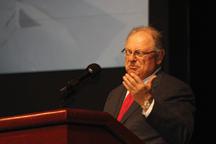
I would guess I have attended about a dozen Yom HaShoah commemoration services since I first began working for The Chronicle in 1988. While I don’t attend every event I am invited to in the community for a variety of reasons, since 2011 I have attended every single one of these services. I am drawn to that event because I think it is important to support our survivors, their families and reinforce the fact that the Holocaust happened.
As I sat quietly in the White Theatre waiting for the service to begin, listening to Ellen Kort and Coleen Dieker perform music from “Schindler’s List,” I was already moved. Still I had no idea how much this particular service would make me feel.
I don’t have any family that perished in the Shoah. Most of my family on both sides was chased out of Europe during the pogroms of the early 1900s. I learned about the Holocaust in religious school and was afraid of those unsettling pictures we were shown of people starving in the concentration camps. My parents knew some Holocaust survivors and I knew some children of survivors, but I guess I didn’t really understand why they were different except they had funny accents.
As a journalist I have interviewed many survivors and gotten to know a few. The ones I have met are lovely people. But most of our discussions have been about their Holocaust stories. How did it affect them? How did they manage to survive? How did they eventually arrive in Kansas City?
This commemoration was different. In his opening remarks, KU Hillel Rabbi Neal Schuster reminded us we should remember that these people’s stories were more than just the Holocaust. (See more on page 21) They had other stories to tell, some just pre-Holocaust, others pre- and post-Holocaust.
In our community there were many with post-Holocaust stories. On Sunday, through their children, we learned how several of our local survivors made it to, as Rabbi Schuster described it, the promised land of Kansas City.
Beginning with Benny Harding, the commemoration’s 2016 chairman and the son of survivors Dorothy and Harry Harding of blessed memory, we learned about the lives of these survivors. The Jewish community here welcomed them and gave them safety net services such as shelter and employment. Many became successful entrepreneurs as did Harry Harding, who worked hard, provided for his family and even brought his wife’s father and two brothers to the United States.
I was so interested in the stories these people known as the second generaiton — Ralph Hartwich, Joyce Hess, Rita Sudhalter, Alice Jacks Achtenberg, Art Federman and Evy Tilzer — told about their parents that I stopped taking good notes. I listend and watched while some had tears in their eyes, and others chuckled, as they recalled stories that some of them didn’t even know until they were adults.
As always, there are sad parts, one of which is when the six candles are lit. Those candles represent survivors, the second and third generations, youth who need to be taught about the Holocaust, veterans and armed forces members, and the community. As each representative is introduced, those in the audience who are a part of that group are asked to stand — or this year raise a hand. The first candle is always for survivors. This year I counted only about a dozen in attendance. I know of others whose health no longer allows them to be there. As did others I imagine, I looked around to see who was there while at the same time thinking of those who stood up in the past.
As I’ve said, I’ve been to a lot of these services — maybe not as many as I should — and I’d like to commend the lead agencies that organized it: The Jewish Community Center, the Jewish Community Relations Bureau|American Jewish Community and the Midwest Center for Holocaust Education. The program this year was by far the most interesting I can remember. It reminded us that yes, those who died and suffered were victims of “the lunacy of a mad man who hated Jews.” But even more importantly, it reminded us that the mad man, Hitler, didn’t win. For the most part, those who made it to Kansas City, and other cities like ours in Israel and around the world, succeeded in life. They led interesting lives, they had love, and they raised children, who are raising children, who can tell their stories — the horrible parts and the good parts — that we all need to know. It reminds us, as the song the Hyman Brand Hebrew Academy combined choirs sing every year, states, “I still believe in spite of everything that people are good at heart.”



